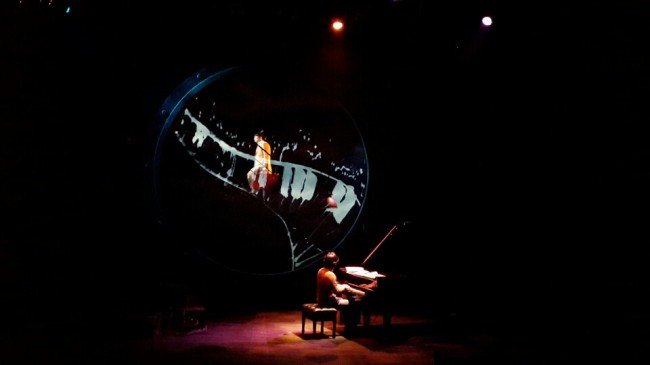 |
A scene from the play “Novecento.” (BOM Arts Project) |
In his essay “I Am Melody,” pianist Kwak Yoon-chan says jazz is the music of the less privileged. “Jazz emphasizes the unstressed beat, instead of the stressed.”
And the musician certainly empathizes with his pianist character in the on-going play “Novecento,” Italian playwright Alessandro Baricco’s most famous work. The unique character, named Novecento in honor of the 20th century ― it means 900 in Italian ― was born in 1900 on the transatlantic ship the Virginian.
His parents abandoned him by leaving him on a piano on the ship soon after his birth. Throughout his life, Novecento ― who was named by a kind sailor who found him ― never leaves his ship; his innate talent makes him a fine pianist, and he spends his entire life playing for the passengers, many of whom are immigrants from Europe en route to America, searching for a better life.
The play is a monologue featuring an actor who plays Max (played by Lee Geon-young), a trumpet player who reminisces about Novecento, whom he met and became friends with on the ship. While the audience members listen to Max, Kwak, who plays the Novecento now only alive in Max’s memories, plays improvisational jazz tunes. He sometimes plays the familiar melody of Hong Nan-pa’s well-known children’s song “Springtime in My Hometown,” as well as the popular “Santa Claus is Coming to Town.”
Baricco premiered the theater monologue in 1994, and it was adapted into a film by Giuseppe Tornatore, “The Legend of 1900,” with music famously composed by Ennio Morricone. The film was released in theaters in Korea in 2002, but the original play only premiered in Seoul in 2012. The current run is the second time the play has been performed in Korea.
The play reaches its climax as Max reminisces about Novecento’s difficult decision, which he thinks he did not fully understand in the past.
“Novecento” is the story of a man who belongs nowhere, or who only belongs to the ocean, whose unique life somehow overlaps with the ones of those who leave their homes for a new and better life. They are about to create a future from nothing but a dream, willing to take risks and transform themselves into someone else.
Novecento also dreams about the real world, while playing his music on the ship, but he does not disembark. The audience learns about the reason why by the end of the play, and the restless jazz music played by Kwak ― almost dreamy, sad and sometimes delightful ― certainly helps them understand the life of the unusual protagonist.
While Kwak offers jazz scores in the play, pianist Park Jong-hwa, who shares the role with Kwak, plays well-known classical scores by Chopin, Rachmaninov, Mozart and Schubert. Actor Jo Pan-soo also shares the role of Max with actor Lee Geon-young.
“Novecento,” which opened on Dec. 6, runs until Dec. 29 at The Stage in Seoul’s Sinchon district. Tickets range from 25,000 won to 35,000 won. For more information, call 1544-1555.
By Claire Lee (
dyc@heraldcorp.com)








